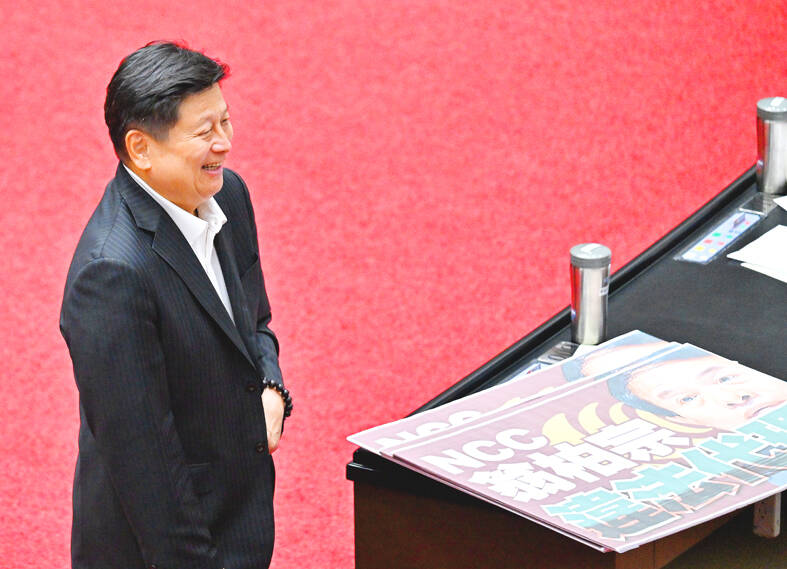Legislators yesterday approved amendments setting a starting date that limits National Communications Commission (NCC) members to two terms effective Dec. 1, paving the way for the dismissal of NCC Acting Chairman Wong Po-tsung (翁柏宗) and potentially suspending the body’s work for the time being.
The amendments passed their third reading with the combined 55 votes of the Chinese Nationalist Party (KMT) and Taiwan People’s Party (TPP) against the Democratic Progressive Party’s (DPP) 48 votes.
The changes to the National Communications Commission Organization Act (國家通訊傳播委員會組織法) setting term limits and removing clauses regarding extensions or reappointments were initially passed in July, but did not include a timeline for when they would go into effect.

Photo: Liu Hsin-de, Taipei Times
The Executive Yuan thus appointed then-NCC vice chairman Wong as acting chairman on July 30, the day before then-chairman Chen Yaw-shyang (陳耀祥) completed his term.
NCC Secretary-General Huang Wen-che (黃文哲) said that at present, only three of the seven NCC commissioners remain in office after four departed upon completing their term at the end of July.
Once Wong leaves, the three commissioners would not be able to administer the body’s 104 tasks and functions, since a quorum of at least four members is needed to convene decisionmaking meetings, Huang said.
The opposition parties have opposed reviewing and confirming nominees for NCC commissioners presented by the DPP government.
The amendments state that commissioners would be appointed to a four-year term, which can only be extended once.
While Article 16 of the act stipulates that “the promulgation date of the act is to be set per order of the Executive Yuan,” the opposition-backed amendments state that “the promulgation date of the act would be set for Dec. 1,” blocking Wong from continuing to serve as commissioner as he had completed his term at the end of July and terminating his post as acting chairman at the start of next month.
The KMT and the TPP have opposed Wong serving as acting chairman, deeming him a political appointee who guides and steers the commission’s policies and guidelines in favor of the DPP government.
DPP caucus chief executive Rosalia Wu (吳思瑤) accused the opposition parties of trying to stop the NCC from carrying out its work.
Without the NCC supervising or regulating telecommunications and Internet affairs, all Taiwanese would be affected, she said.
“The NCC has to manage regulations and measures that affect people’s daily lives and economic activities, including media and broadcasting, Internet and mobile phone services, signal transmissions and cellular networks. Unfortunately, the opposition is using politics to paralyze the NCC, which harms all citizens,” Wu said.
The four commissioners who had completed their terms at the end of July are Wong, Chen, Lin Li-yun (林麗雲) and Wang Wei-ching (王維菁).

Taiwanese were praised for their composure after a video filmed by Taiwanese tourists capturing the moment a magnitude 7.5 earthquake struck Japan’s Aomori Prefecture went viral on social media. The video shows a hotel room shaking violently amid Monday’s quake, with objects falling to the ground. Two Taiwanese began filming with their mobile phones, while two others held the sides of a TV to prevent it from falling. When the shaking stopped, the pair calmly took down the TV and laid it flat on a tatami mat, the video shows. The video also captured the group talking about the safety of their companions bathing

US climber Alex Honnold is to attempt to scale Taipei 101 without a rope and harness in a live Netflix special on Jan. 24, the streaming platform announced on Wednesday. Accounting for the time difference, the two-hour broadcast of Honnold’s climb, called Skyscraper Live, is to air on Jan. 23 in the US, Netflix said in a statement. Honnold, 40, was the first person ever to free solo climb the 900m El Capitan rock formation in Yosemite National Park — a feat that was recorded and later made into the 2018 documentary film Free Solo. Netflix previewed Skyscraper Live in October, after videos

Starting on Jan. 1, YouBike riders must have insurance to use the service, and a six-month trial of NT$5 coupons under certain conditions would be implemented to balance bike shortages, a joint statement from transportation departments across Taipei, New Taipei City and Taoyuan announced yesterday. The rental bike system operator said that coupons would be offered to riders to rent bikes from full stations, for riders who take out an electric-assisted bike from a full station, and for riders who return a bike to an empty station. All riders with YouBike accounts are automatically eligible for the program, and each membership account

A classified Pentagon-produced, multiyear assessment — the Overmatch brief — highlighted unreported Chinese capabilities to destroy US military assets and identified US supply chain choke points, painting a disturbing picture of waning US military might, a New York Times editorial published on Monday said. US Secretary of Defense Pete Hegseth’s comments in November last year that “we lose every time” in Pentagon-conducted war games pitting the US against China further highlighted the uncertainty about the US’ capability to intervene in the event of a Chinese invasion of Taiwan. “It shows the Pentagon’s overreliance on expensive, vulnerable weapons as adversaries field cheap, technologically